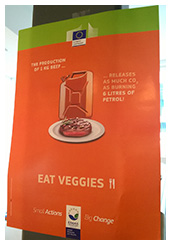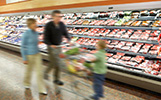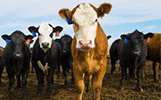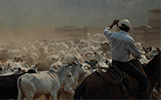| State, National Meat Producers Look to Grab Worries About 'Sustainable Beef' by the Horns 
Barbara Soderlin, Omaha World–Herald | March 9, 2016
Ask a dozen people in Nebraska's beef industry, and you'll get as many answers. To some who worry about beef's environmental impact, "sustainable beef" is an oxymoron. To others, time–tested conventional practices are sustainable and getting more so every day — big ranches, feedlots and meatpackers wouldn't still be in business otherwise, they say.
Now industry players including the Nebraska Cattlemen's Association; major Nebraska employers Tyson Foods, JBS and Cargill; and one of the state's largest feedlot operators, Adams Land and Cattle, are part of a national effort to build some consensus on what "sustainable" means.
Dr. Oz Knows Beef Makes Good TV, But Why Do Viewers Believe Him? 
Amanda Radke, BEEF Magazine | March 8, 2016
Dr. Oz is a popular TV personality/medical professional who loves to use his credentials to scare his viewers about the foods they eat and convince them that with each day, he's found the "secret to weight loss." Last week, Dr. Oz aired a segment titled, "Is America's beef healthy?"
It's troubling to me to see such a biased, slanted report being shared on such a popular TV show, and it's even more alarming to watch the cheering from the crowd as Dr. Oz pretended to slay the dragons that are America's beef producers. It's disheartening to see this mistrust in farmers and ranchers grow, and I'm worried the chasm between producers and consumers continues to widen.
Dietary Guidance; Is It Really About Climate Change?
Ruaraidh Petre, Linkedin | March 14, 2016
A Swedish study (D.Bryngelsson et al., 2016), talks about cutting "food related" emissions by 50% as being essential to preventing warming of more than 2C, and further suggests that this necessitates a dramatic (50%) reduction in the consumption of ruminant meat. This is to my mind a very clear example of science being led astray by an a priori agenda against ruminant livestock.Food related emissions vary from place to place, but it should be recognised that nowhere are food related emissions the highest proportion of anthropogenic emissions.
What Does It Take For Farmers To Earn Public Trust?
Brenda Scheopp, Canadian Cattlemen | March 11, 2016
What does it take to earn public trust? A few initiatives are underway to answer that question and address the concerns that consumers have already expressed. It is not that the public does not mistrust farmers — they just don't know them.
Symposium to Promote Rangeland Sustainability
Josie Musico, Lubbock Avalanche–Journal | March 7, 2016
A Symposium on Sustainable Rangeland will be held June 6–7 at the National Ranching Heritage Center. "Rangeland sustainability is a key concept that all ranchers, landowners, technicians and resource managers strive to achieve and maintain," said Dr. Ron Sosebee, one of the symposium's organizers and professor emeritus in the Department of Natural Resources Management at Texas Tech.
Assessing the Environmental Impact of Meat Production 
The Cattle Site | March 7, 2016
A new European project is being established to map, understand and reduce the environmental impact of packed fresh meat from beef, pork and lamb. The MEAT project is being driven by leading players in the EU meat sector including AHDB Beef and Lamb in the UK, Bord Bia from Ireland, Célene in France, COV in the Netherlands and the Danish Agriculture and Food Council, together with meat processing companies Dawn Meats, Dunbia and Danish Crow and internationally by Beef + Lamb New Zealand and Meat and Livestock Australia.
Speaking at the AHDB Beef and Lamb processor conference, AHDB business development manager Christine Walsh said that there were a lot of different measurement systems around the world to measure the carbon footprint and environmental impact of meat production through to the final product and its consumption. The aim of the EU project is to assess the existing relevant PEF methodologies in the meat sector and to develop a single set of rules covering the entire life cycle of meat products.
Why 'Zero Deforestation' Is Only One Piece of The Sustainability Puzzle 
Pablo Pacheco, Sophia Gnych, Forests News | March 17, 2016
In the midst of efforts to achieve 'zero deforestation', it's important to remember that halting deforestation is not just about forests, and it is not always good for local people, depending on how it is done. Commitments should therefore also involve finding investment and production models that work for all stakeholders – public or private, big or small – and supporting the smallholder farmers who depend on agricultural commodities for their living. | |
